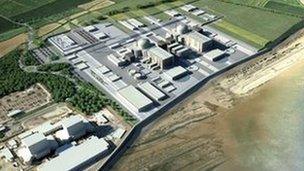Irish challenge to UK approval of new nuclear plant in Somerset
- Published

The National Trust of Ireland has begun a legal challenge against the UK government over its decision to approve a new nuclear plant in England.
The plant at Hinkley Point in Somerset was granted planning permission by the Energy Secretary, Ed Davey, last month.
However, the trust (known as An Taisce in Irish) has said the Irish people should have been consulted before the UK government granted approval.
An Taisce wants a judicial review at the High Court in London.
Its spokesman said the proposed plant is as close to the Irish coast as it is to London, and is closer to Dublin than it is to Leeds.
An Taisce is an environmental charity and it is independent from the Irish government, which is not involved in the judicial review.
'International law'
The charitable trust has claimed that in not consulting the Irish people about the Hinkley Point plan, the UK government may have breached European regulations.
It said it had lodged papers at the High Court, challenging the government's "legal compliance" with the European Environmental Impact Assessment (EIA) Directive.
The directive requires that affected EU members states are informed and consulted during the planning stage of certain infrastructure projects that could have a significant impact on the environment.
However, the UK's Department of Energy and Climate Change said the decision-making process "took full account of applicable EU and other international law".
An Taisce said its legal challenge was focused not on the construction of the power plant itself, but on the importance of carrying out a proper public consultation and enforcing compliance to existing environment laws.
'Concern'
The trust's director of operations, James Nix, said: "This case is not about interfering with the right of the UK authorities to make their own decisions, nor about being pro- or anti-nuclear.
"It is about ensuring that the rights and interests of the Irish public and their concern for their environment are not excluded from those decisions, and that the Irish public is properly consulted in accordance with the law on a project of this nature."
In a later interview with the Irish state broadcaster, RTE, Mr Nix said he had urged the Irish government to step up its involvement and added he did not know why it is not as engaged as it might be on the subject.
A government spokesman said that while the Republic of Ireland does not favour the use of nuclear energy, it recognises the sovereign right of each country to make up its own mind on the nuclear issue.
Earlier this week, Irish Environment Minister, Phil Hogan, was asked in parliament to outline the communications his department had to date with the UK authorities regarding the Hinkley Point development.
Mr Hogan replied that in 2009, the UK government had signalled its intention to construct a number of new nuclear plants and he said Ireland "has been actively involved in the consultation process on the new build programme".
'Radiological impacts'
He said that since that date, Irish government ministers had written twice to the UK energy secretary to highlight their "concerns about potential environmental impacts in Ireland and in the Irish Sea".
Mr Hogan added that the Irish government was notified of the proposed development at Hinkley Point C in early 2012.
He confirmed that he has asked the Radiological Protection Institute of Ireland to carry out an assessment of the "potential radiological impacts on Ireland" from the proposed new generation of UK nuclear power plants, including Hinkley Point.
The report is due to the published shortly and will examine the likely environment impact of routine operations at the plants and also what might happen in the event of an accident.
Mr Hogan added: "While not having a nuclear power industry, it is Ireland's position that, where a state chooses to develop a nuclear power industry, this should be done in accordance with the highest international standards with respect to safety and environmental protection.
"Ireland's priority is the safety of the Irish people and the protection of our environment, including the shared marine environment of the Irish Sea."
'25,000 jobs'
When the UK energy secretary approved the Hinkley Point development last month, Mr Davey said the project was "of crucial national importance".
The proposed £14bn power plant, to be developed by the French energy company EDF, would be capable of powering five million homes.
EDF said the project could create up to 25,000 jobs during the construction period.
In response to An Taisce's judicial review, a spokesman for the UK Department of Energy and Climate Change said they were considering the challenge and would respond in due course.
"The secretary of state's decision to consent Hinkley Point C was in line with the Planning Inspectorate's recommendation," the DECC spokesman added.
- Published20 March 2013
- Published19 March 2013